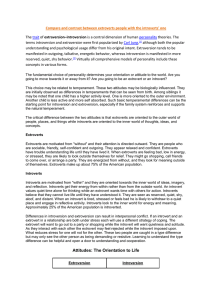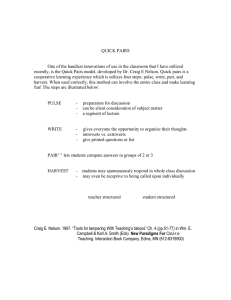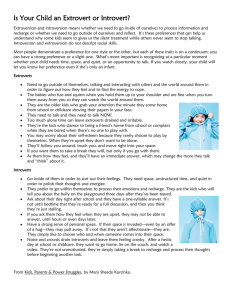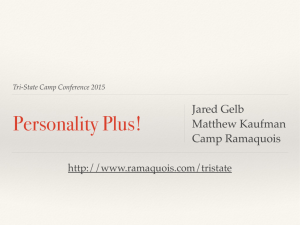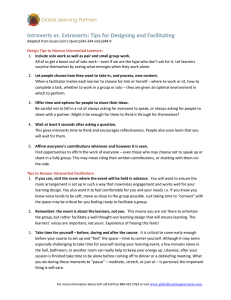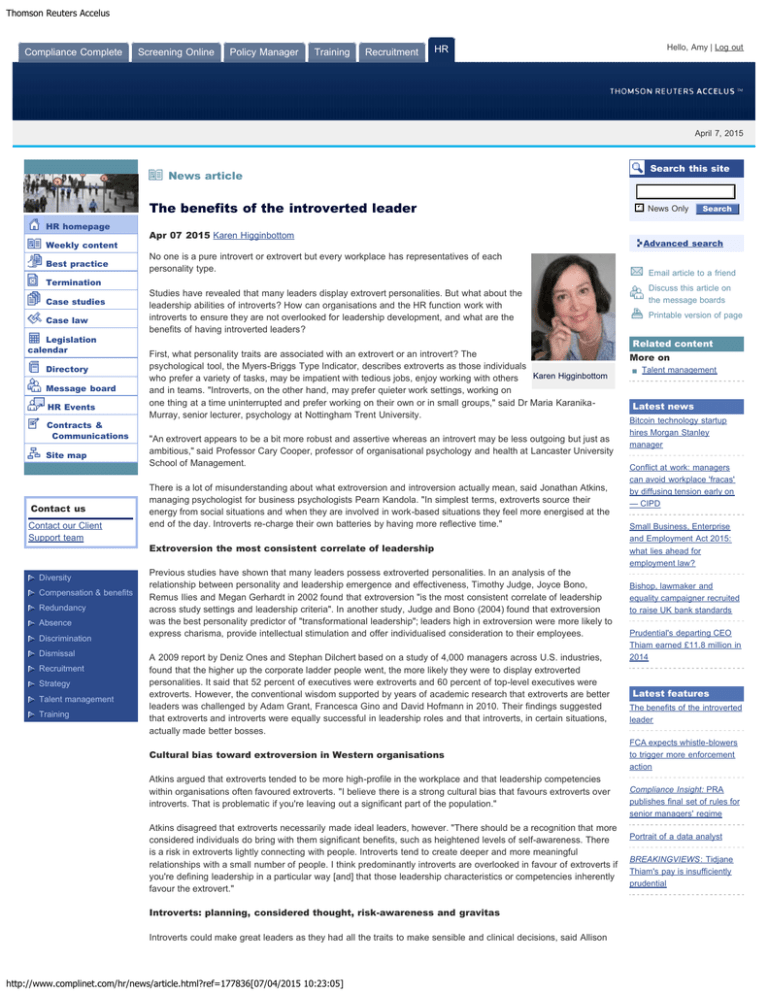
Thomson Reuters Accelus
Compliance Complete
Screening Online
Policy Manager
Training
Recruitment
Hello, Amy | Log out
HR
April 7, 2015
Search this site
News article
The benefits of the introverted leader
HR homepage
Weekly content
Best practice
Apr 07 2015 Karen Higginbottom
No one is a pure introvert or extrovert but every workplace has representatives of each
personality type.
Termination
Case studies
Case law
Legislation
calendar
Directory
Message board
HR Events
Contracts &
Communications
Site map
Contact us
Contact our Client
Support team
Diversity
Compensation & benefits
Redundancy
Absence
Discrimination
Dismissal
Recruitment
Strategy
Talent management
Training
Studies have revealed that many leaders display extrovert personalities. But what about the
leadership abilities of introverts? How can organisations and the HR function work with
introverts to ensure they are not overlooked for leadership development, and what are the
benefits of having introverted leaders?
First, what personality traits are associated with an extrovert or an introvert? The
psychological tool, the Myers-Briggs Type Indicator, describes extroverts as those individuals
Karen Higginbottom
who prefer a variety of tasks, may be impatient with tedious jobs, enjoy working with others
and in teams. "Introverts, on the other hand, may prefer quieter work settings, working on
one thing at a time uninterrupted and prefer working on their own or in small groups," said Dr Maria KaranikaMurray, senior lecturer, psychology at Nottingham Trent University.
"An extrovert appears to be a bit more robust and assertive whereas an introvert may be less outgoing but just as
ambitious," said Professor Cary Cooper, professor of organisational psychology and health at Lancaster University
School of Management.
There is a lot of misunderstanding about what extroversion and introversion actually mean, said Jonathan Atkins,
managing psychologist for business psychologists Pearn Kandola. "In simplest terms, extroverts source their
energy from social situations and when they are involved in work-based situations they feel more energised at the
end of the day. Introverts re-charge their own batteries by having more reflective time."
Extroversion the most consistent correlate of leadership
Previous studies have shown that many leaders possess extroverted personalities. In an analysis of the
relationship between personality and leadership emergence and effectiveness, Timothy Judge, Joyce Bono,
Remus Ilies and Megan Gerhardt in 2002 found that extroversion "is the most consistent correlate of leadership
across study settings and leadership criteria". In another study, Judge and Bono (2004) found that extroversion
was the best personality predictor of "transformational leadership"; leaders high in extroversion were more likely to
express charisma, provide intellectual stimulation and offer individualised consideration to their employees.
A 2009 report by Deniz Ones and Stephan Dilchert based on a study of 4,000 managers across U.S. industries,
found that the higher up the corporate ladder people went, the more likely they were to display extroverted
personalities. It said that 52 percent of executives were extroverts and 60 percent of top-level executives were
extroverts. However, the conventional wisdom supported by years of academic research that extroverts are better
leaders was challenged by Adam Grant, Francesca Gino and David Hofmann in 2010. Their findings suggested
that extroverts and introverts were equally successful in leadership roles and that introverts, in certain situations,
actually made better bosses.
Cultural bias toward extroversion in Western organisations
Atkins argued that extroverts tended to be more high-profile in the workplace and that leadership competencies
within organisations often favoured extroverts. "I believe there is a strong cultural bias that favours extroverts over
introverts. That is problematic if you're leaving out a significant part of the population."
Atkins disagreed that extroverts necessarily made ideal leaders, however. "There should be a recognition that more
considered individuals do bring with them significant benefits, such as heightened levels of self-awareness. There
is a risk in extroverts lightly connecting with people. Introverts tend to create deeper and more meaningful
relationships with a small number of people. I think predominantly introverts are overlooked in favour of extroverts if
you're defining leadership in a particular way [and] that those leadership characteristics or competencies inherently
favour the extrovert."
Introverts: planning, considered thought, risk-awareness and gravitas
Introverts could make great leaders as they had all the traits to make sensible and clinical decisions, said Allison
http://www.complinet.com/hr/news/article.html?ref=177836[07/04/2015 10:23:05]
✔
News Only
Search
Advanced search
Email article to a friend
Discuss this article on
the message boards
Printable version of page
Related content
More on
Talent management
Latest news
Bitcoin technology startup
hires Morgan Stanley
manager
Conflict at work: managers
can avoid workplace 'fracas'
by diffusing tension early on
— CIPD
Small Business, Enterprise
and Employment Act 2015:
what lies ahead for
employment law?
Bishop, lawmaker and
equality campaigner recruited
to raise UK bank standards
Prudential's departing CEO
Thiam earned £11.8 million in
2014
Latest features
The benefits of the introverted
leader
FCA expects whistle-blowers
to trigger more enforcement
action
Compliance Insight: PRA
publishes final set of rules for
senior managers' regime
Portrait of a data analyst
BREAKINGVIEWS: Tidjane
Thiam's pay is insufficiently
prudential
Thomson Reuters Accelus
Peasgood, director of training and consultancy specialist OMS. "While their extrovert counterparts are out on the
floor talking to employees and trying out new ideas, introverts plan, plan and plan again. They are able to work
alone to great effect within the need to constantly run ideas past people. Many introverts possess extrovert
qualities. They can interact with others and lead teams successfully, not out of the need for friendship or popularity
but out of respect."
Introverts were great at roles that required gravitas, considered thought and a keen awareness of risk, said John
Mclachlan, leadership development consultant at Monkey Puzzle training and consultancy. "Introverts play an
invaluable role in any group as they are generally more reflective, think things though and consider risks. Because
they are natural thinkers and enjoy working through their thoughts alone, they often have amazing ideas no one
else has thought of."
Dr Patricia Hind, director, centre for research in executive development at Ashridge Business School, said it was
not difficult to cite examples of introverted leaders who had made a real difference. "Currently, Barack Obama, Bill
Gates and Mark Zuckerberg are all representative of individuals who have led significant change through their
reserved yet determined personal styles."
Developing introverts for leadership
But how can introverts be developed for leadership roles in organisations? Hind said that organisations must
acknowledge the strengths that introverts brought to the workplace. "In our action-orientated Western culture, we
tend to overlook the thoughtful people who are not making a lot of noise and attracting attention to themselves. Our
preferred organisational processes are often collaborative and public, like brainstorming, and these don't speak to
introverted strengths. Organisations must make both emotional and physical room for introverts by allowing them to
be thoughtful and analytic and even by making some 'quiet spaces' available."
The key to developing introverts as leaders is to understand that they take in information from the world and
respond to the world in a different way from extroverts, Mclachlan said. "Introverts need space and time to reflect
and consider. In helping them to develop it's therefore useful to give them private space to work or a quiet space
where people can go when they need to think without the hustle and bustle. Don't force them to participate in large
group work whenever possible. You'll get much more out of them in small groups or one-to-one meetings."
Learning to behave as an extrovert in certain situations
Hind said that introverts often had to learn to behave as extroverts in certain situations if they were to reach senior
leadership positions. "HR has a role to play here to encourage the development of introverts in a way that gives
others confidence in their ability to lead. An environment must be created in which difference is valued, not simply
tolerated. This means that talent and performance management systems need to be granular enough to detect
introverted strengths but also to create development space for difference in leadership styles."
Atkins agreed that HR had a critical role in developing introverts as leaders. "They have a key responsibility to
ensure that competency frameworks for leadership are not biased against a certain personality type. It's about
opening people's eyes to the different benefits that personality types can bring to the workplace. A lot of people
recognise the benefits that extroverts bring to the workplace but we need to redress that balance and highlight the
benefits that introverted leaders can bring."
Karen Higginbottom is a freelance journalist who writes on employment issues for The Guardian and People
Management magazine. She has written on a diverse range of topics, from transexuals in the workplace to bullying
bosses.
<< Back
THOMSON REUTERS GRC | © 2012 THOMSON REUTERS. ALL RIGHTS RESERVED.
CONTACT US
TERMS & CONDITIONS
PRIVACY STATEMENT
TWITTER
http://www.complinet.com/hr/news/article.html?ref=177836[07/04/2015 10:23:05]
GRC CONNECTS
LINKEDIN

